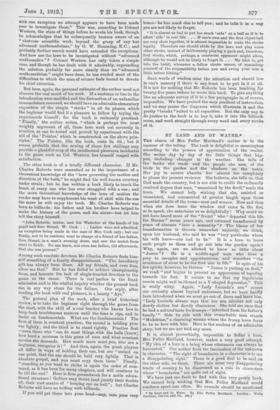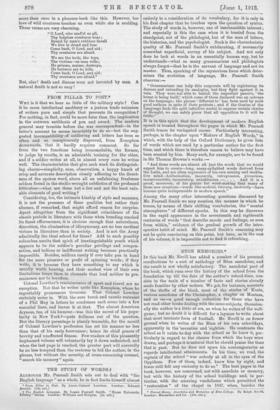BY LAND AND BY WATER.* THE charm of Mrs. Fuller
Maitland's matter is in the manner of the telling. The book is delightful or meaningless according to the powers of appreciation of the reader. She writes day by day of the little things that hap- pen, including changes in the weather. She tells of the books she reads and the people she sees, of the birds in the garden and the shadows on the water. Her joy in nature absorbs her almost too completely to please the present reviewer. She believes, she tells us, that God made the country, but is not able to credit the ordinarily received dogma that man, "unassisted by the devil," made the town. We cannot help wishing that she, assisted or unassisted, had commented at greater length upon those essential details of the town—men and women. Now and then when she does leave the window and come to the fire, so to speak, she entertains us so delightfully ! Why could we not have beard more of the " friend " who "departed this life for Burma " seven years ago, and returned transformed by years of absence "into 'a nonentity "P The blame of her transformation is thrown somewhat unjustly, we think; upon her husband, who said he was "very particular whom his wife knew—one had to be." It is a bore to leave such people as these and go out into the garden again ! Why, again, are we allowed to know so little about " James " P He is a middle-aged man who lives a prey to scruples and apprehensions, and considers " the avoidance of error to be the first aim in life." In spite of his low spirits, however, be thrives. " James is putting on flesh," we read, " and begins to present an appearance of tapering towards his feet. It occurs to me that my lugubrious cousin might well be likened to a V-shaped depression." Thin is really witty. Again, "Lady Lucinda's son" rouses our curiosity almost beyond endurance, but we have hardly been introduced when we must go out of doors and leave him: "Lady Lucinda always says that her son admires not only dowdy clothes but dowdy characters. She told me once that he had a natural taste for frumps—' inherited from his father's family.' " Side by side with this remarkable man standi "Madeleine," a charming woman whom the frump lover fears to be in love with him. Here is the nucleus of an admirable story, but we are not told any more.
It is, almost proverbially, impossible to define a bore. Mrs. Fuller Maitland, however, makes a very good attempt. " My idea of a bore is a being whose utterances can always be forecasted." Our author feels the fascination of the unknown in character. " The sight of boundaries in a character is to me a disappointing sight." There is a good deal to be said on the other side, we think. There arc some very disappointing tracts of country to be discovered as a rule in characters whose " boundaries " are quite out of sight.
We have jest one fault to find with this very pretty book: We cannot help wishing that Mrs. Fuller Maitland would condemn sport less often. No crusade should be mentioned your very oard"ner, Darton and CO. teed
Ella Fuller Maitland. London: Wall*
more than once in a pleasure-book like this. However, her love of wild creatures touches us even while she is scolding.
These verses are very charming.
"0 Lord, who mad'st us all, Thy helpless creatures hear ; Bound by man's ruthless thrall We live in dread and fear. Come back, 0 Lord, and aid : Thy creatures are afraid.
We are the tools, the toys, The victims—as man wills ; He prisons, maims, destroys, He tortures ore he kills. Como back, 0 Lord, and aid: Thy creatures are afraid."
But, alas ! death and disease were not invented by man. A natural death is not so easy I







































 Previous page
Previous page